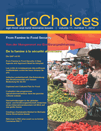
African Journal of Agricultural and Resource Economics-AFJARE
Scope & Guideline
Bridging knowledge and practice in resource economics.
Introduction
Aims and Scopes
- Agricultural Economics and Policy Analysis:
AFJARE focuses on the economic aspects of agriculture, including policy analysis, market dynamics, and the economic impact of agricultural practices on rural livelihoods. This includes evaluations of subsidy programs, trade policies, and the economic implications of climate-smart agriculture. - Food Security and Nutrition:
The journal frequently publishes research on food security and nutrition, emphasizing the role of agricultural practices in ensuring food availability and improving dietary diversity among rural households. This includes studies on crop yields, food systems, and access to nutritious food. - Climate Change and Adaptation Strategies:
Research on the effects of climate change on agriculture, as well as adaptation strategies employed by farmers, is a core area for AFJARE. This includes studies on climate variability, crop resilience, and the adoption of sustainable practices to mitigate climate impacts. - Gender and Empowerment in Agriculture:
AFJARE explores the intersection of gender and agriculture, investigating how women's empowerment and participation in agricultural activities affect productivity and economic outcomes. This includes analyses of gender-differentiated impacts of agricultural policies and practices. - Technological Innovations in Agriculture:
The journal highlights the role of technological advancements in enhancing agricultural productivity, including the adoption of improved seeds, sustainable practices, and innovations in pest management. Research often evaluates the economic viability of these technologies for smallholder farmers.
Trending and Emerging
- Climate-Smart Agriculture:
There is a noticeable increase in research focused on climate-smart agricultural practices. Studies are exploring the yield advantages and profitability of these practices, indicating a growing recognition of their importance in enhancing resilience to climate change. - Financial Inclusion and Economic Welfare:
Emerging themes around financial inclusion, particularly in relation to smallholder farmers, are gaining traction. Research is focusing on how access to financial services impacts economic welfare and food security, emphasizing the role of finance in agricultural development. - Technology Adoption and Innovation:
The adoption of technological innovations in agriculture is a rising theme, with an emphasis on evaluating the benefits of improved seeds, sustainable practices, and new agricultural technologies. This trend highlights the importance of innovation in overcoming productivity challenges. - Migration and Adaptation Strategies:
The relationship between migration and agricultural adaptation is increasingly being studied. This reflects a growing understanding of how demographic movements can serve as strategies for coping with climate change and economic pressures in rural areas. - Gender Dynamics and Empowerment:
Research focusing on gender dynamics within agricultural contexts is trending, particularly studies examining the empowerment of women and its effects on agricultural productivity and household welfare, indicating a broader recognition of gender issues in agricultural economics.
Declining or Waning
- Traditional Crop Production Methods:
There appears to be a decrease in research focusing solely on traditional farming techniques without integration of modern practices. As the field evolves, there is a growing emphasis on innovation and resilience, leading to lesser focus on conventional methods that do not incorporate sustainability. - General Agricultural Extension Services:
Research on general agricultural extension services has seen a decline as more specific and targeted studies emerge. The journal's focus is shifting towards evaluating the effectiveness of tailored extension services that address specific challenges faced by farmers rather than broad, generalized programs. - Economic Impacts of Specific Commodities:
Studies solely focused on the economic impacts of specific commodities, such as single crops or livestock, are becoming less frequent. Instead, there is a trend towards integrated assessments that consider multiple factors influencing agricultural systems and their broader economic implications.
Similar Journals

EuroChoices
Shaping scholarly discourse in economics and geography.EuroChoices, published by WILEY, is a leading journal in the fields of economics and geography, demonstrating a significant impact as evidenced by its exceptional rankings—Q1 in both Economics, Econometrics and Finance and Geography, Planning and Development for 2023. With an ISSN of 1478-0917 and an E-ISSN of 1746-692X, this esteemed journal has been a pivotal platform for scholarly discourse since its inception in 2003, evolving thoughtfully to encompass contemporary issues and trends through 2024. Situated in the United States, it serves as an essential resource for researchers, professionals, and students alike, offering insights that bridge economic theories with geographical perspectives. While it maintains a traditional publishing approach without open access options, the journal continues to thrive, achieving high ranks in Scopus—with Economics positioned 37th out of 242 and Geography at 151st out of 821—highlighting its role as a critical contributor to the academic community.

Journal of Rural Studies
Exploring the Dynamics of Rural LifeWelcome to the Journal of Rural Studies, a premier peer-reviewed publication dedicated to advancing the field of rural research. Published by PERGAMON-ELSEVIER SCIENCE LTD, this esteemed journal has been a cornerstone of scholarly discourse since its inception in 1985 and continues to evolve through 2024. With an impressive impact factor and categorization in the Q1 tier across various fields, including Development, Forestry, Geography, Planning and Development, and Sociology and Political Science, the journal is among the elite voices in rural studies. Researchers, professionals, and students alike will find invaluable insights within its pages, supported by rigorous empirical research and theoretical explorations that address the complexities of rural life and its myriad challenges. While it currently does not offer open access, the subscription model ensures a broad dissemination of knowledge, fostering collaboration and innovation within the academic community. With a robust Scopus ranking that places it in the top percentiles across multiple social sciences, the Journal of Rural Studies remains an essential resource for those dedicated to understanding and improving rural environments worldwide.

Bio-based and Applied Economics
Exploring the Intersection of Economics and Environmental StewardshipBio-based and Applied Economics, an esteemed journal published by FIRENZE UNIV PRESS, is an open-access platform dedicated to the dissemination of innovative research and critical reviews in the interdisciplinary areas of agronomy, animal science, and food science, with a strong emphasis on the economic and environmental implications of bio-based applications. Since its inception in 2012, the journal has positioned itself as a valuable resource for academics and professionals alike, boasting a commendable Q2 ranking across various fields, including Economics, Environmental Science, and Applied Biological Sciences. With its notable impact factor and commitment to accessible research, it aims to foster knowledge exchange and stimulate advances in bio-economy practices. This journal not only contributes significantly to scholarly discourse but also serves as a crucial tool for policymakers and industry leaders seeking evidence-based solutions to contemporary challenges in sustainability and resource management.

Asian Journal of Agriculture and Development
Empowering agricultural development with cutting-edge research.Asian Journal of Agriculture and Development is a prestigious academic journal dedicated to advancing the field of agricultural research and development within the context of Southeast Asia. Published by the Southeast Asian Regional Center for Graduate Study and Research in Agriculture, this journal plays a vital role in disseminating innovative findings and best practices critical for sustainable agricultural development in the region. With a focus on interdisciplinary studies that integrate agricultural science, policy development, and socio-economic factors, the journal invites researchers, professionals, and students to contribute rigorous research that addresses contemporary challenges faced by the agriculture sector. Although it operates within a non-open access framework, the journal aims to ensure wide visibility and accessibility of its publications through strategic collaborations and institutional partnerships. By engaging with its content, stakeholders can gain valuable insights and foster meaningful dialogue that drives forward agricultural progress in Asia.

Studies in Agricultural Economics
Pioneering Research for Rural Development SolutionsStudies in Agricultural Economics is a premier journal published by AGRARGAZDASAGI KUTATO & INFORMATIKAI INTEZET in Hungary, focusing on innovative research in the interdisciplinary fields of agricultural, biological, and economic sciences. Since becoming an Open Access journal in 1997, it has aimed to enhance the visibility of agricultural economics scholarship while promoting global engagement among researchers, practitioners, and policymakers. With its robust Q2 and Q3 rankings across varied categories including Development and Geography, this journal serves as a significant platform for disseminating cutting-edge studies that address crucial issues in agriculture and rural development. The journal's continuous publication since 2011 until 2024 exemplifies its commitment to providing timely insights into evolving agricultural challenges. With a strong Scopus ranking across multiple domains, particularly in the social sciences and agricultural sectors, it stands as a vital resource for anyone looking to advance knowledge and practice in these critical areas.

Annual Review of Resource Economics
Unveiling the Dynamics of Resource AllocationThe Annual Review of Resource Economics is a premier journal published by Annual Reviews, focusing on the multifaceted field of economics with a particular emphasis on resource allocation, sustainability, and environmental impact. With an impressive impact factor and recognized as a Q1 journal in the 2023 category of Economics and Econometrics, it ranks in the top 90th percentile among its peers, specifically at #66 out of 716 in Scopus rankings. Since its inception in 2010, the journal has provided a vital platform for the dissemination of comprehensive reviews and critical analyses, serving as an essential resource for researchers, professionals, and students seeking to explore the dynamic intersections of economics and resource management. Its commitment to scholarly rigor without compromising accessibility makes it an indispensable asset to the academic community, contributing significantly to the discourse on resource economics in an ever-evolving global landscape. The journal does not currently offer open access, ensuring exclusive content for subscribers.

AUSTRALIAN JOURNAL OF AGRICULTURAL AND RESOURCE ECONOMICS
Empowering insights for sustainable resource management.Introducing the AUSTRALIAN JOURNAL OF AGRICULTURAL AND RESOURCE ECONOMICS, a premier publication dedicated to advancing the fields of agricultural and resource economics. Published by Wiley in the United Kingdom, this journal boasts an impressive Impact Factor, reflecting its significance and influence within its disciplines. Classified as Q1 in Agricultural and Biological Sciences and Q2 in Economics and Econometrics for 2023, it ranks among the top journals in these fields, with notable Scopus rankings of 16/193 and 121/716 respectively. With convergence from 1996 to 2024, the journal aims to disseminate innovative research, critical analysis, and empirical studies that address pressing economic issues in agriculture and resource management. Through its commitment to high-quality research and multiple open access options, the AUSTRALIAN JOURNAL OF AGRICULTURAL AND RESOURCE ECONOMICS serves as an essential resource for researchers, professionals, and students alike, fostering knowledge and dialogue in this vital area of study.

Agricultural Economics-Zemedelska Ekonomika
Exploring the nexus of agriculture and economics.Agricultural Economics-Zemedelska Ekonomika is a prominent open-access journal published by the Czech Academy of Agricultural Sciences, dedicated to advancing the field of agricultural economics and related disciplines. Since its inception in 2007, this journal has provided a vital platform for researchers, professionals, and students to disseminate and engage with cutting-edge insights and empirical studies that contribute to the understanding of agricultural practices, economic theories, and policy analysis. With an impressive impact factor reflected in its 2023 quartile rankings of Q2 in both Agricultural and Biological Sciences and Economics, Econometrics and Finance, the journal ranks highly among its peers, specifically occupying the 46th position out of 288 in General Economics and 40th among 193 in Agricultural Sciences, highlighting its broad relevance and respected status. The journal's open access model ensures that research is widely disseminated and easily accessible, fostering an inclusive academic environment that encourages collaboration and knowledge sharing. With a commitment to publishing quality research until at least 2024, Agricultural Economics-Zemedelska Ekonomika remains a crucial resource for those dedicated to improving agricultural productivity and sustainability through economic insight.

PAKISTAN JOURNAL OF AGRICULTURAL SCIENCES
Pioneering Research in Crop and Soil SciencesWelcome to the Pakistan Journal of Agricultural Sciences, a prominent platform for disseminating vital research findings in the fields of agronomy, crop science, food science, plant science, and soil science. Published by the prestigious University of Agriculture in Faisalabad, this journal aims to enhance the scientific discourse surrounding agricultural innovation and sustainability in Pakistan and beyond. With an ISSN of 0552-9034 and E-ISSN of 2076-0906, the journal serves as a valuable resource for researchers, professionals, and students interested in cutting-edge agricultural developments. As of 2023, the journal is ranked in the Q3 category for Agronomy and Crop Science as well as Food Science and positioned in Q4 for Plant and Soil Science, highlighting its growing impact within a competitive academic landscape. While the Pakistan Journal of Agricultural Sciences is not currently open access, it provides a comprehensive archive of research converging from 2011 to 2024, ensuring that critical knowledge remains accessible to those striving to advance the agricultural sciences. Join us in our mission to foster innovation and support sustainable practices in agriculture.

Agricultural and Food Economics
Exploring innovative insights for sustainable food systems.Agricultural and Food Economics is a leading journal published by SPRINGERNATURE, dedicated to the advancement of research in the interconnected fields of agriculture, food systems, and economic analysis. Established in 2013 and operating under an Open Access model, this journal serves as a vital platform for scholars and practitioners to disseminate innovative findings and insights that influence policy and practice. With a notable impact reflected in its 2023 quartile rankings—Q1 in Agricultural and Biological Sciences (miscellaneous), Q2 in Economics and Econometrics, and Q1 in Food Science—this journal is recognized for its rigorous scholarly output. It ranks among the top resources in its domain, with Scopus ranks placing it in the 88th percentile for Agricultural and Biological Sciences and the 79th percentile for Economics. The journal covers a broad spectrum of topics, including sustainable agricultural practices, the dynamics of food markets, and the economic implications of food policies. Researchers, professionals, and students alike will find valuable insights and comprehensive analyses that contribute to the ever-evolving discourse on food and agriculture.